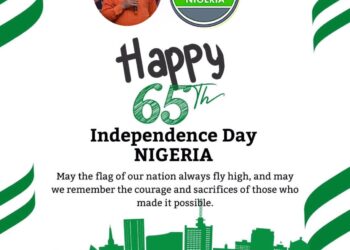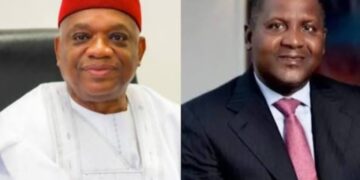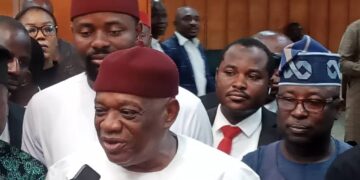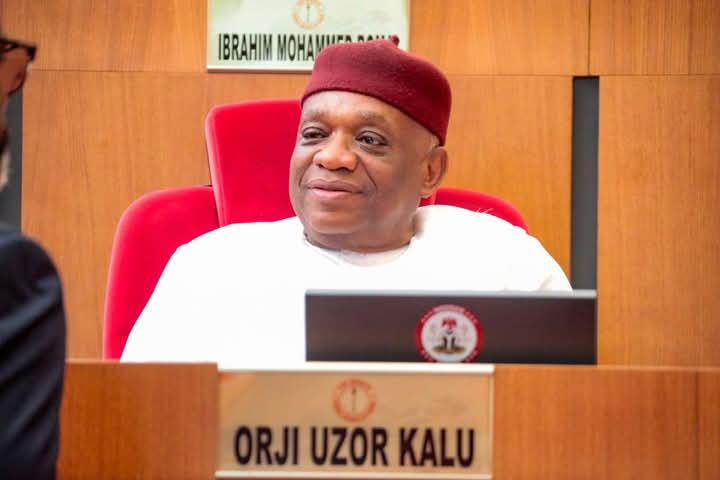- By Okoye Chuka Peter
Sixty-five years in the life of a nation is no small milestone. Like a grey-haired elder, Nigeria ought to sit at the banquet of nations with dignity, boasting of wisdom, resilience, and solid institutions. Yet here we are: a country at 65, still squabbling over her identity, still hobbling under the weight of avoidable missteps, and still celebrating her birthday with discordant tones of both laughter and lamentation.
Three decades after independence, Nigeria was battered by coups, a bloody civil war, and successive military adventurism. Yet, amidst the chaos, there was at least a coherent attempt at national development. The First Republic, albeit short-lived, birthed enduring institutions: regional competitiveness, agricultural revolutions in cocoa, palm oil, and groundnuts, and an educational system that was once the envy of Africa.
Fast forward to six decades, what is the story? Instead of building on that foundation, we have experienced progressive dismemberment. Our universities are now strike zones rather than citadels of learning. Industries that once gave us hope have either become ghost estates or church auditoriums.
The Nigerian child who should be preparing to compete with the world now competes with hunger, unemployment, and insecurity. The child of independence who should be an accomplished elder at 65 is instead a pensioner abandoned at the mercy of survival, groaning under the weight of unkept promises.
Section 14(2)(b) of the 1999 Constitution (as amended) declares that “the security and welfare of the people shall be the primary purpose of government.” But our leaders have mastered the dark art of turning constitutional promises into political proverbs, quoted with gusto, ignored in practice. Today’s Nigerian politician is a professional shape-shifter: a patriot in the opposition, a predator in government. Restructuring: our perennial bride, remains forever engaged, never wedded, forever paraded but never carried home.
Nigeria is not without promise. We are blessed with vast deposits of crude oil, gas, solid minerals, arable land, and a population brimming with youthful energy and entrepreneurial spirit. In saner climes, these are assets that propel nations into prosperity.
Yet, for Nigeria, they oscillate between blessings and curses: resources that should have fueled development have instead fueled corruption; human capital that should be our ladder has been turned into a wasted generation. The paradox is tragic, our abundance has become our affliction.
And what shall we say of the third tier of government: the local governments, which, in truth, should have been the closest channel of governance to the people? The Supreme Court and even presidential directives have upheld their autonomy, yet state governors have turned them into fiscal hostages, withholding or siphoning their monthly allocations. Local councils, stripped of life, now exist only as signposts and salaries for cronies.
This travesty undermines grassroots development: roads remain impassable, primary schools collapse into dust, and rural health centres are glorified consulting rooms. By denying local governments their constitutional independence, governors have reduced democracy to an empty chorus, strangling the very nerve-centres of national progress. If federalism is already false, this subversion of the third tier is its gravest insult.
Where are the patriot-statesmen of the First Republic who used their privileged positions to create wealth, expand opportunities, and develop human capacity? They may have had their flaws, but at least they governed with a semblance of vision. In their stead, we now have political elites who perfect the art of “motion without movement.”
Governance is reduced to endless committees, policies recycled like old newspapers, and ribbon-cutting ceremonies for projects that die weeks after commissioning. Nigeria at 65 is like a masquerade in the village square, grandly dressed but dancing off-beat. The audience claps out of pity, not admiration.
Yet, to say all hope is lost would be unfair. Frantic efforts are being made by a few responsible politicians in this dispensation who genuinely seek to steer Nigeria away from the path of ruin. Their voices may be drowned by the discordant orchestra of selfish elites, but their efforts remain a flicker of light in our tunnel of uncertainty. It is that flicker we must guard jealously, nurture, and expand into a blazing flame of national rebirth.
We cannot continue to toast champagne at Independence Day parades while the ordinary Nigerian drinks tears for breakfast. We cannot continue to wear agbada of rhetoric when the people’s stomach is clothed with hunger. Section 16(1)(a) of our Constitution mandates the State to “harness the resources of the nation and promote national prosperity and an efficient, dynamic, and self-reliant economy.” Yet, how can we harness resources when the nation herself is chained to a false federalism, a “federal republic” where power is centralized in Abuja like a colonial master? Our structure is a fraud, and our leaders know it. They thrive on it. They sing restructuring in campaigns but shelve it in office, because true federalism would deprive them of the feeding bottle they suck with unashamed glee.
CONCLUSION
At 65, Nigeria stands at a crossroads. We either choose to restructure, to build sustainably, and to revive the patriotic spirit of our founding fathers, or we continue to drift into the abyss of arrested development. Let it be known: patriotism is not the singing of the anthem on October 1st, but the practical enactment of justice, equity, and genuine federalism.
As citizens, we must refuse to clap for discordant tunes. The masquerade must be reminded that the dance is for the people, not for her own ego.
At 65, Nigeria must rise beyond rhetoric and embrace the substance of nationhood. Anything less is a betrayal of generations unborn. Yet, with the little rays of hope ignited by a handful of committed leaders, we may still salvage this dream called Nigeria, if only we, the people, demand it with one voice.
Happy 65th Independence Anniversary!
For Press Release, Tip-off, Sponsored Post Contact Us: Whatsapp: (234)7038111972 | Email: info@abacitybloq.com












